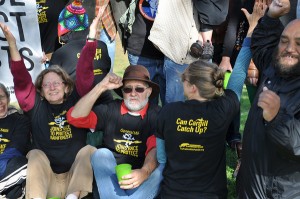
Cargill just released their 2010 Corporate Responsibility Report, which provides an overview of Cargill’s amazing lackluster efforts to address supply chain issues including sourcing palm oil associated with rainforest destruction and social conflict. Titled “Growing Together,” the report is a seriously misleading account of the environmental and human rights achievements of the world’s largest privately owned corporation.
What’s most perplexing is that in this new report, Cargill highlights their PT Hindoli palm plantation in South Sumatra as “such a strong model for sustainability that the Indonesian government uses it as a prime example of sustainable palm oil production,” while just days before an article in the Jakarta Post came out reporting strong evidence that PT Hindoli (a unit of the Cargill Group) had conducted land clearing in a large swathe of forest outside the company’s conession area- a serious violation which carries hefty penalties.
The article noted that Hindoli’s offence has been confirmed by an audit by the Indonesian Supreme Audit Agency (BPK); at the end of this Jakarta Post piece Cargill claims they’re working with the Foresty Ministry to pay their fines and settle the matter.
In this new CSR report Cargill claims it is is “committed to advancing the sustainability of oil palm production around the world” yet even after three years of RAN campaigning and calling on Cargill to do so they have yet to release and adopt a responsible palm oil sourcing policy after years of RAN campaigning for them to do so.

Cargill claims to have their “own policies for responsible palm production,” but what they’re calling “policies” are actually just a couple of minimal criteria such as not planting on high conservation value forests (HCVF), not developing new plantations on deep peat land or land that would threaten biodiversity, and enforcing a strict no-burn policy for land preparation. Interestingly, we found Cargill to be violating even these most basic commitments as documented in RAN’s investigative report released this spring.
Equally as disappointing, although Cargill is the largest importer of palm oil into the U.S. and supplies palm oil to most major food company in America, it still has unacceptably weak goals for sourcing sustainable palm oil even as it controls 20-25% of the world palm oil trade. Cargill has, for example, the relatively meaningless goal of buying 60 percent of its total crude palm oil from RSPO members by the end of 2010. However, many RSPO Members are currently in gross violation of RSPO standards. PT SMART, a subsidiary of Sinar Mas Group, was just recently censured by the RSPO for its destructive palm oil practices. But Cargill refuses to drop Sinar Mas as a source of palm oil in its supply chains. This despite major global customers like General Mills, Unilever and others insisting that they do not want to purchase any palm oil at all that comes from Sinar Mas.
General Mills has recently announced its goal of sourcing 100% certified responsible palm oil by 2015 with a purchasing preference for RSPO certified palm. They join a growing number of major food companies around the world demanding 100% segregated RSPO-certified palm oil from their suppliers.
Cargill needs to move quickly beyond the greenwash if it is going to be able to meet the growing demand for responsible palm oil in time.